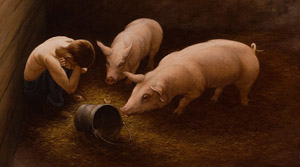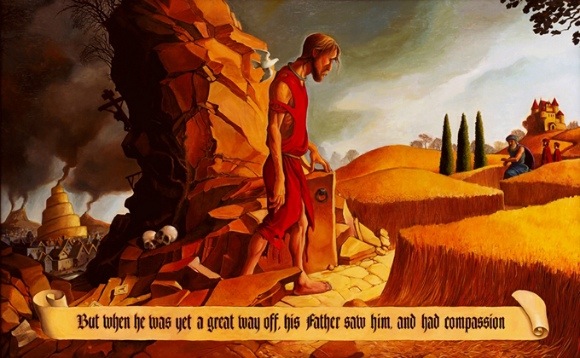The Prodigal Son
A Homily for the Fourth Sunday in Lent, Year C – Delivered at St. Barnabas Church in Sykesville, MD
It’s wonderful to be here this morning, to return to a community that I owe so much to and have so much affection for. That being said, I know I haven’t been as good at keeping in touch as I might have been, but inviting me back to preach about the prodigal son may be laying it on a little thick.
The prodigal son is one of my favorite stories in the Bible, and I’ve never had the opportunity to preach on it before now. It is perhaps one of the most well known passages in the bible and the basic story is simple and relatable. A wealthy man has two sons, and upon coming of age the younger son wastes no time in making an ass of himself. I can only imagine that after some heated argument that likely included a sentence similar to “as long as you live under my roof you will follow my rules” the young man demands to be given his share of the family’s holdings so that he can go out into the world and make his way unburdened by the weight of his family. We all know how the story ends, having been relieved of all the money he was given by a series of poor choices he returns home, hoping to live as one of his father’s slaves and he doesn’t even get to finish the first sentence of what I suspect was a rather long speech of apology before he is wrapped in expensive clothes and the order is given that a feast be prepared in his honor.
This story is believable for most people, it certainly is for me. As a paramedic in a college town I have had the exasperating privilege of treating and transporting young people who have made a dazzling array of bad choices, car accidents, drugs, alcohol and various combinations. I often have to call their parents from the back of the ambulance and I can tell you that once I get out my name and that I’m a paramedic I have yet to encounter a parent that cared about anything except that there child was safe and healthy and could come home. The father in this story shows us those priorities, the father in this story represents God. It is a wonderful thing to know, especially during our Lenten season of self examination that nothing we can ever do will change the fact that no matter how bad we screw up, that once we are done with our human foolishness that in the moment that we begin to kick ourselves and feel less than human, all God wants is to know that we are safe, and healthy, and home.
We all have times when we feel like the prodigal son, most of us carry those moments close to our hearts as an ever present reminder of mistakes we must avoid. But I think far more often we can relate to the older brother in this story. The poor fellow is out in the fields working, no one from the family comes and gets him, he is stumbling home, exhausted from the days labor, probably noting as usual that he has twice as much to do now that his younger brother has gone off to who-knows-where, and there is music and the smell of delicious meat wafting from the house like it’s a feast day. The older brother is aghast, who knows how much ill will he actually has toward his brother but he at least would have wanted to see him yelled at a little, humiliated, made to understand the hurt he had inflicted. The older brother simply wants justice, and instead the deadbeat runt is being treated to a free dinner before the older brother is even finished cleaning the days dirt out from under his fingernails.
So he refuses to go in. He holds the completely logical assertion that for sloth, foolishness, and weakness to be rewarded more greatly than his shrewd and successful management of the family holdings is the definition of insanity. Much of our culture would agree with him whole heartedly. I can’t turn on a news show without hearing aggressive rhetoric about how wasteful and dis-incentivizing the support we provide for the undeserving poor is, and since many of these voices support the idea that we live in a “Christian nation” they have employed a verse that has gained a lot of traction in recent years. I think it is a phrase that encapsulates the older son’s position and I’ll let you all finish it for me.
“God helps those who…”
That’s right,
“God helps those who help themselves”.
In the late nineties a man named George Barna did a poll of Americans and their knowledge of the bible, he found that this phrase was by far the most recognized bible verse in America. 78 percent of high school students polled identified it as the central theme of the bible and when Jay Leno asked people on the street if they could name any of the ten commandments “God helps those help themselves” was the most often given answer.
So, who can tell me what the problem is with this information?
That’s right, the phrase “God helps those who help themselves” isn’t in the bible, not even a little bit.
I would offer that if you ignore context and try hard enough you can find a verse from the bible to show that god supports almost any cockamamie notion you want, and yet I challenge you to find anything like the previous phrase which I’m done saying for the morning. A fun thing about the parables is that Jesus often throws in the most important bits as cryptic lines that can easily be overlooked. The gospel passage starts by explaining that Jesus was spending time with undesirables, and that the Jewish authorities had a problem with this. So Jesus tells this heartwarming story about a benevolent father who welcomes home his child, forgiving his transgressions without even being asked. The metaphor is simple that Jesus, acting on God’s behalf will welcome sinners.
But where does this leave the older son, what reward does he get if any for his faithful righteousness? “You are always with me, and whatever is mine is yours” That sounds nice, what does it mean? From the father it is a loving rebuke, I can imagine that in his fervor to be perfect and to make up for his brother’s failings that it never occurred to the Older son that no one, including his father, would object if he slaughtered any of the livestock to throw a party. His father tells him essentially “I love you, you are my partner, and I can trust that you will do what’s right with all that I have to give”.
If the father in this story represents God, then on the days when our hustle and hard work put us in a place where we, like the begrudging older sibling in this story, feel under-appreciated in the face of those who seem to offer less than they take, what does it mean to us to hear from God “You are always with me, and whatever is mine is yours”? There are two gifts given in this story, they both stem from God’s boundless love. The first is this joyful, jubilant forgiveness that celebrates repentance such that apologies are cut short. The second gift, and I think the greater, is the opportunity to be a participant in the building up of God’s kingdom. To me, this is the foundation, the first overture of God’s call for us to be disciples, the unsaid clause that hangs behind “You are always with me, and whatever is mine is yours” is “now what are you going to do about it?”
Perhaps a central theme of the bible is that it is our privilege, on the occasions that we are strong, to help God help those who cannot help themselves. This is important to discipleship because it means that their is no difference in the eyes of god between the responsible and the prodigal, only different gifts to be offered. we can realize at long last that the mornings when we wake up and that isn’t us, when we cannot help ourselves, when we are all out of steam and we can’t seem to get anything right, that it’s okay, and that no matter how hard we want to beat ourselves up, how we want to lay down before God and shout about our unworthiness, all god wants is to hold us for a moment, to celebrate with us that moment when we see the ways in which we have strayed from the things that bring us true joy.
This is what lent is all about. It is about identifying those pieces of ourselves that keep us from building up the kingdom of heaven. Whether those things are about squandering the gifts and resources we have been given, or perhaps about cultivating them so jealously that we become paralyzed when the time comes to give them away. God has no interest in us lingering unnecessarily on these things that haunt us. Because we are always with God, God has given us all that God has, and tomorrow it will be our turn to welcome home a prodigal child.
AMEN
Luke 15:1-3, 11b-32
All the tax collectors and sinners were coming near to listen to Jesus. And the Pharisees and the scribes were grumbling and saying, “This fellow welcomes sinners and eats with them.”
So Jesus told them this parable:
“There was a man who had two sons. The younger of them said to his father, ‘Father, give me the share of the property that will belong to me.’ So he divided his property between them. A few days later the younger son gathered all he had and traveled to a distant country, and there he squandered his property in dissolute living. When he had spent everything, a severe famine took place throughout that country, and he began to be in need. So he went and hired himself out to one of the citizens of that country, who sent him to his fields to feed the pigs.
 He would gladly have filled himself with the pods that the pigs were eating; and no one gave him anything. But when he came to himself he said, ‘How many of my father’s hired hands have bread enough and to spare, but here I am dying of hunger! I will get up and go to my father, and I will say to him, “Father, I have sinned against heaven and before you; I am no longer worthy to be called your son; treat me like one of your hired hands.”‘ So he set off and went to his father.
He would gladly have filled himself with the pods that the pigs were eating; and no one gave him anything. But when he came to himself he said, ‘How many of my father’s hired hands have bread enough and to spare, but here I am dying of hunger! I will get up and go to my father, and I will say to him, “Father, I have sinned against heaven and before you; I am no longer worthy to be called your son; treat me like one of your hired hands.”‘ So he set off and went to his father.
But while he was still far off, his father saw him and was filled with compassion; he ran and put his arms around him and kissed him. Then the son said to him, ‘Father, I have sinned against heaven and before you; I am no longer worthy to be called your son.’ But the father said to his slaves, ‘Quickly, bring out a robe–the best one–and put it on him; put a ring on his finger and sandals on his feet. And get the fatted calf and kill it, and let us eat and celebrate; for this son of mine was dead and is alive again; he was lost and is found!’ And they began to celebrate.
 “Now his elder son was in the field; and when he came and approached the house, he heard music and dancing. He called one of the slaves and asked what was going on. He replied, ‘Your brother has come, and your father has killed the fatted calf, because he has got him back safe and sound.’ Then he became angry and refused to go in. His father came out and began to plead with him. But he answered his father, ‘Listen! For all these years I have been working like a slave for you, and I have never disobeyed your command; yet you have never given me even a young goat so that I might celebrate with my friends. But when this son of yours came back, who has devoured your property with prostitutes, you killed the fatted calf for him!’ Then the father said to him, ‘Son, you are always with me, and all that is mine is yours. But we had to celebrate and rejoice, because this brother of yours was dead and has come to life; he was lost and has been found.'”
“Now his elder son was in the field; and when he came and approached the house, he heard music and dancing. He called one of the slaves and asked what was going on. He replied, ‘Your brother has come, and your father has killed the fatted calf, because he has got him back safe and sound.’ Then he became angry and refused to go in. His father came out and began to plead with him. But he answered his father, ‘Listen! For all these years I have been working like a slave for you, and I have never disobeyed your command; yet you have never given me even a young goat so that I might celebrate with my friends. But when this son of yours came back, who has devoured your property with prostitutes, you killed the fatted calf for him!’ Then the father said to him, ‘Son, you are always with me, and all that is mine is yours. But we had to celebrate and rejoice, because this brother of yours was dead and has come to life; he was lost and has been found.'”
